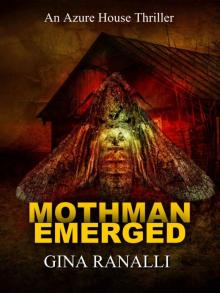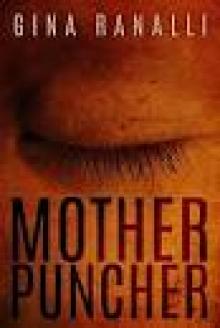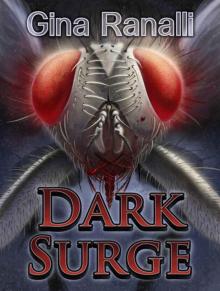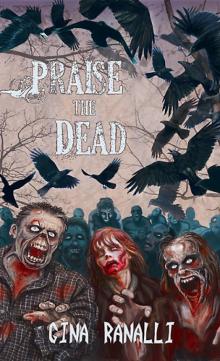- Home
- Gina Ranalli
Ghost Chant Page 2
Ghost Chant Read online
Page 2
Maggie was crying now, but Cherie was way beyond caring. She struck the girl’s face with an open palm but that just didn’t feel satisfying enough.
She punched her instead.
Once.
Twice.
A third time.
And that annoying fucking brat wouldn’t shut up now. She just screamed and screamed and screamed, so loud the storm was drowned out and Cherie had no choice but to wrap her hands around the tiny fucking throat and squeeze.
Squeeze.
Squeeze and squeeze and fucking squeeze.
6
When it was over, Cherie looked up from where she sat on her studio floor. She was dazed, her hair hanging in her face, her muscles sore from being so fiercely tensed. She gazed around the room feeling as though she’d just woken up from a blackout.
Her eyes fell dully on the dead girl sprawled on the floor next to her and she took a deep breath, held it for many seconds, and finally sighed heavily.
She was suddenly very exhausted. She couldn’t remember the last time she’d felt so tired.
Or . . .
Or hungry.
She realized she was ravenous and wished she could have her favorite Greek food again. She was disappointed when she consulted the wall clock and saw that it was twenty after eight. The place closed at eight. She felt a tiny twinge of anger return and looked at Maggie, prepared to take it out on the girl again, but quickly discovered she was much too tired for rage now. Her rage was spent.
Maybe I should sleep now, she thought. Right here on the basement floor. On the cold cement floor.
She wondered where the time had gone. Had she somehow lost an hour? How did that happen?
Slowly, painfully, she got to her feet and stood staring down at the body, feeling nothing but numb, though she knew she should certainly be feeling something more than that.
“This is not good,” she heard herself mutter. It was her own voice. There was no denying that. But it sounded oddly separate from herself. As though it had not come from inside her own head, but some other her, another Cherie, standing right beside her and speaking the words.
“Not good at all,” she agreed with herself.
“We need a drink,” the other, outside Cherie, said.
“Right. We do.”
Cherie left the basement, turning out the light and closing the door behind her.
In the kitchen, she resumed pouring herself the glass of wine that had been interrupted by the strange metallic tapping earlier.
She took the glass from the counter and sat down at the table with it, sighing again. “What a day,” she whispered and chugged down half the glass, wiping her lips with the back of her hand when she was done. “What a goddamn fucking day.”
Shaking her head, she wondered what was next.
“You’re fucking screwed, that’s what,” the other, outside Cherie told her, almost sounding amused.
Cherie snorted a little. “Got that fucking right.”
She polished off the rest of her wine and went to get some more. At the counter, she pushed aside the curtains and looked out the window. Across the street, the Kerr house was lit up like a Christmas tree. Teresa must have turned on every light in the damn house.
“Huh.”
She let the curtain fall closed and filled her glass again. “Jesus, Mary and Joseph,” she said as she sat at the table once more. She frowned at the expression. It was her dad’s and one she seldom, if ever, used because it had so offended her mother’s delicate Christian sensibilities.
She drank the wine slowly this time, waiting for it to relax her, waiting for her nerves to stop jangling and for that other version of herself to stop muttering in her ear.
“I need to figure out what to do here,” she said.
She thought about that for a while.
Call the police.
That was the sensible thing to do, of course. The right thing, the thing she really had to do whether she liked it or not.
Cherie nodded to herself and drank her wine. She would call the police, certainly. There was no question about it. But she needed to think first. What would she tell them? The truth?
She didn’t know how the law would react to that but she knew it would be bad. And forget the law for a second, what about Teresa?
Time to think this through. That’s all she needed. Just a little time.
And in order to gain that time, as far as she could tell, there was only one thing to do: hide the body.
7
After debating on the best place to put little Maggie, Cherie decided that no place would make her feel entirely comfortable unless she had easy access to her. Or was she an “it” now? She supposed it was.
This revelation eased her conscience somewhat. The child was no longer a child but a thing and a thing could be easily dealt with.
She carried the body up to her bedroom and laid it on the floor beside the bed while she made room for it in the closet.
The closet was a good size, its large mirrored sliding door’s reflection making the room appear to be twice its actual size.
The chore only took her about ten minutes and then the body was safely stowed behind the door, placed in a seated position with knees pushed up toward the chest, head lolling back and to the right, lips slightly parted.
Cherie did what she’d seen countless other people do in movies: she gently closed the eyelids and then stepped back to better view the corpse. So pale and still. At last, she slid the closet door closed and went back downstairs to finish another glass of wine.
Looking out the front window, she now saw a police cruiser in Teresa’s driveway, its lightbar dark.
She realized she hadn’t heard any sirens either and assumed the police must not be overly alarmed at this point.
That was good but their presence was disturbing. What were they telling Teresa? What was she telling them?
She wondered briefly if she should go over there feigning concern but quickly decided against it. That would look suspicious.
In fact, if someone were to look over here and see her looking out the window, would that also arouse suspicion?
Best not to take chances.
She let the curtain fall back and left the kitchen, turning out the lights and moving into the living room where she turned on the TV, flipping through the channels until she found a popular police procedural that had been on for years.
Settling back on the couch, she put her wine glass on an end table and tried to concentrate on the show.
Eventually, she relaxed and nearly forgot what she had done, though she nibbled at her fingernails for the duration of the show. At the first commercial break, she drained her wine glass and considered going to fetch more, but decided against it. She should remain as sober as possible for what she assumed would come next in this sad little drama of her life: waiting until the wee hours and then loading Maggie into her car and driving her someplace desolate to bury her.
It, she reminded herself. She’s now an it.
She tried to ponder the best place for the burial but the thought made her queasy.
How had this happened? Her day had been so typical. Hell, her life had been so typical. Never had she suspected she’d find herself in this predicament. But, did anyone? How many hundreds of others had been in this very same place? Simply snapped, left with the tattered remains of a once normal life?
If only that fucking brat hadn’t been so bizarre. If Teresa had just kept an eye on the kid every once in a while. None of this would have happened.
The show came back on and Cherie focused her attention once more. It wasn’t easy. It drained every ounce of willpower in her system, but she knew the important thing was to remain calm. Panicking would cause mistakes and she couldn’t allow that.
Be calm. Act natural.
She supposed it was a mantra she would have to get used to, possibly for the rest of her life.
The one thing she had going for her, she knew, was that she’d nev
er been in any kind of trouble with the law. Not so much as a speeding ticket. The cops would never even suspect her, which was good. Very good.
The first program ended and the next began. It was almost identical to the previous show. Another police procedural in which the main characters weren’t police at all, yet they were all kicking down doors and chasing serial killers through dark alleyways just the same.
The show had barely begun when Cherie realized that the episode was about a woman who had murdered a child.
A little girl.
The beginning was told from the murderer’s point of view. A crazy middle-aged single woman who was lonely had abducted the child, mistakenly assuming the girl would keep her company and be fine with having been kidnapped once she saw the enormous doll collection the woman kept in her spare bedroom. Naturally, the child didn’t cooperate and the woman, growing increasingly frustrated, accidentally killed her.
Death by strangulation.
It was quite eerie, Cherie realized. The similarities to what was happening in her own life.
But, of course, the woman on screen was insane. Once she got rid of the body, it was revealed that the girl hadn’t been the first such victim. Nor would she have been the last if the courageous non-police officers hadn’t figured out the entire plot and rescued the next child in line for the creepy doll collection.
During another commercial break, Cherie muted the TV and rose, intending to use the bathroom, but a sound coming from outside gave her pause. She froze, listening.
A child’s sing-song voice coming from her backyard.
Cherie briefly considered ignoring it, but the time of night seemed strange. It was uncommon for her neighbor’s children to roam the area at this hour.
With a sigh, she crossed the room and lifted one of the window blinds to peer out into the backyard.
It was dark out there—almost too dark to see anything—but the light from her living room cast just enough illumination for her to make out the small figure standing atop her picnic table.
The child, hooded, his or her face in complete shadow, didn’t move but nevertheless gave the impression of looking directly at Cherie’s window.
Cherie frowned at the small silhouette. She tapped on the window glass and the singing abruptly stopped, though the child still did not move so much as a muscle as far as Cherie could tell.
She tapped again. “Go home,” she called.
The little girl replied, her voice a few octaves too low, though perfectly clear:
“There’s something in the hallway.”
Letting the blind fall closed, Cherie stepped back from the window, her body suddenly tingling with tendrils of fear.
Had she misheard? She must have. Surely the child hadn’t said . . .
Turning away from the window, Cherie marched to the back door and flicked on the porch light, quickly opening the door to confront the girl. Stepping out onto the porch, she immediately saw that the girl was no longer standing on the picnic table. Movement caught her eye to the right and she turned just in time to see the flash of a green raincoat round the side of the house.
“Maggie,” she whispered.
Of course it was. Who else would it be?
8
Instead of giving chase, Cherie went back inside, bolting the door behind her, and went directly upstairs. She walked quickly, a smile cracking her face in two.
Everything had been a dream, then. A very bizarre but realistic and terrible dream.
“Oh, thank God,” she murmured.
In the bedroom, she turned on a light and happily slid the closet door open, expecting to see nothing but hanging garments and shoes on the floor.
But, no.
The body of Maggie Kerr was still folded within the closet, her skin the color and consistency of polished ivory, her small white hands curled stiffly beneath her chin.
Heart sinking, Cherie sighed and that electric feeling of fear returned, jangling her nerves.
But it wasn’t entirely fear now was it?
No, it wasn’t.
She had to admit, though her belly felt as though a snake was writhing and curling within it, she also felt . . . excitement.
“It feels good to be bad, don’t it, Nikki?”
Cherie whirled, the sound of her father’s voice so close to her ear that he must have been standing right behind her.
But of course he wasn’t.
She was alone in the room, just as she had been a moment before. Her and Maggie. No father and certainly not her older sister, Nikki.
Why was she imagining his voice now? she wondered. He’d been in his grave for over a decade and Nikki . . . well, Nikki had been in hers since she was fifteen. Suicide by hanging. Cherie had been the one to discover the body in the closet of the bedroom they’d shared.
Sitting on the edge of the bed, she thought back to that January evening so many years ago. She’d just returned from her piano lesson with Mrs. Dorevitch and her mother had ordered her upstairs to wash up for dinner and while she was at it, tell her sister to come down as well.
Eleven-year-old Cherie had obeyed without much thought, marching up the steps while humming Beethoven’s Für Elise, that day’s lesson, to herself.
Nikki, however, was nowhere to be found and it wasn’t until Cherie had kicked off her tennis shoes and opened the closet door to fling them inside that she’d found her sister hanging from the wooden rod by one of her father’s leather belts.
Cherie could still remember the image vividly, though she doubted that was unusual in cases such as that.
Wearing her white nightgown, Nikki’s face had been ghostly pale with the exception of her lips and chin, which had been plum-purple, along with her arms from the elbows down. Cherie had stared at her dead sister’s purple hands for a long time. Her young brain could not comprehend how such a thing had happened to Nikki. Why were parts of her body so dark? So very, very bruised?
Now Cherie was sure Nikki’s lower extremities had also been purple-black with lividity as well, but she had no memory of that. Just the lower face and hands.
Eventually, she must have screamed or shouted for her parents, but that part was gone from her mind as well. She had no further memory of her sister’s suicide until the wake. Seeing Nikki in her casket, dressed in white yet again, and how odd she had looked, with rosy cheeks and pink, shiny lips, her dark hair seeming more like an old woman’s stiff wig than a teenager’s tresses.
She remembered her mother’s wails and her father’s stoic, grim expression and the teenagers who had come, all of them somber and shocked that one of their own had done such a horrible thing to herself.
For her part, Cherie had spent the majority of those hours still staring at her sister’s hands, now porcelain white along with her heavily made-up face. She remembered wondering how the mortician had managed to cover up all the purple-black skin. She knew blood was drained from bodies after they were dead but that didn’t explain to her what seemed like magic. Or maybe a miracle. Or both.
And now here she stood, an adult, facing yet another dead girl in another closet. It was funny how life worked out sometimes. If only she could call someone, as she did before, and rid herself of this problem.
If only Maggie hadn’t been such an annoying brat, this never would have happened. The little bitch had fucked up her life and unless Cherie could figure something out before Warren came back, she would really have some explaining to do.
Getting the body to the car would be the tricky part, she mused. Although finding a place to dump it would be difficult, as well. It would have to be somewhere far away. Maybe as much as a hundred miles.
Something rustled beneath the bedspread, moving under her right hand, knocking her train of thought off track.
Cherie jumped to her feet and spun around, facing the bed with a mixture of surprise and irritation.
What now?
The bedspread rippled with movement. Something was definitely under there. Small lumps cove
red the bed every few inches, with the exception of where Cherie’s ass had just been. The lumps were roughly the size of half-dollars and were still for long moments before abruptly shifting position with little bounces.
Feeling her mouth dry up, Cherie tried counting the shapes, stopping when the number surpassed twenty.
She debated just leaving the room but the tingle of excitement was back, pulling at her mind, tickling it with possibilities.
There was fear, yes, but the kind which accompanies a kid as the rollercoaster car they’re in crests the top of the first hill.
Cherie reached out and yanked back the bedspread to discover the shapes were deeper, beneath the top sheet. Her fingers hovered, trembling ever so slightly before she pulled back the sheet.
Frogs.
Dozens of frogs were in her bed, now unencumbered by the bedding and hopping freely, almost gleefully.
Gasping, Cherie stepped away from the bed and would have kept going but then her back banged into the closet door, rattling it and coaxing a small squeak of dread from her throat.
Brown and green frogs hopped to and fro, leaving smears of mud in their wakes, leaping over each other, sometimes colliding. Not a single one fell from the edge, as if they had some way of knowing they were near a precipice.
Where had they come from? Why was this happening? Why now?
None of this made sense and Cherie had to fight the instinct to flee the room. This couldn’t be real. It couldn’t be.
A hallucination then? Could she be losing her mind?
If so, it was more vivid than she’d ever imagined a hallucination could be. They were right there. Right in front of her, jumping around, making her sheets filthy. She could touch one if she chose to.
She closed her eyes, took several deep breaths, releasing each one slowly, as if she were meditating.
And then she remembered . . .
She was small again, in the backyard of the old house, playing with a neighborhood boy, if playing is really what it could be called. In truth, they’d been catching frogs—tiny creatures that, for whatever reason, seemed to be fond of the blueberry bushes growing wild at the back of the property.

 Wall of Kiss
Wall of Kiss Sky Tongues
Sky Tongues Ghost Chant
Ghost Chant Suicide Girls in the Afterlife
Suicide Girls in the Afterlife Chemical Gardens
Chemical Gardens Mothman Emerged: Azure House Book 1
Mothman Emerged: Azure House Book 1 Mother Puncher
Mother Puncher Dark Surge
Dark Surge Boneyard Rumblers
Boneyard Rumblers House of Fallen Trees
House of Fallen Trees Praise the Dead
Praise the Dead World Revolver
World Revolver Unearthed
Unearthed